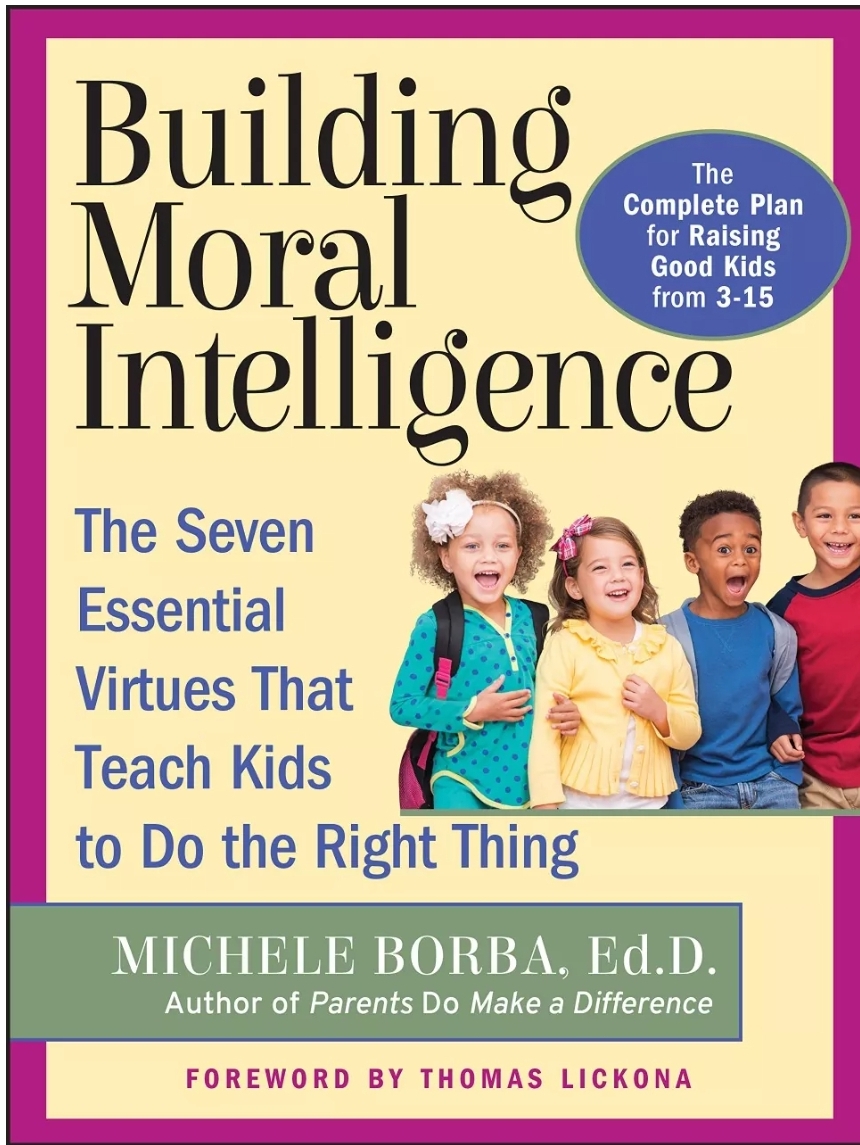Building Moral Intelligence: The Seven Essential Virtues that Teach Kids to Do the Right Thing
Author: Michele Borba, Ed.D.
1st Edition (2001)
Overview
Michele Borba’s Building Moral Intelligence presents a framework for developing moral character in children by focusing on seven essential virtues that help them make ethical choices. Borba argues that just as IQ and emotional intelligence (EQ) can be developed, so can moral intelligence (MQ)—the ability to understand right from wrong and act accordingly.
The book provides practical strategies, parenting techniques, and educational approaches to instill these virtues in children, aiming to raise individuals who stand up for justice, resist negative peer pressure, and contribute positively to society.
The Seven Essential Virtues of Moral Intelligence
Borba identifies seven core virtues that serve as the foundation for moral intelligence:
Empathy – Understanding and Sharing the Feelings of Others
- Helps children recognize the emotions of others and develop compassionate responses.
- Encourages perspective-taking and emotional connection.
- Example: Teaching kids to recognize when a friend is sad and offer comfort.
Conscience – Knowing Right from Wrong and Acting on It
- Develops a strong inner sense of morality and ethics.
- Helps children resist negative influences and stay true to their values even when no one is watching.
- Example: A child returning a lost wallet instead of keeping the money.
Self-Control – Managing Impulses and Delaying Gratification
- Helps children think before acting and make rational, moral decisions.
- Encourages patience, discipline, and resisting temptations.
- Example: A child choosing to study instead of playing video games because they have a test the next day.
Respect – Treating Others with Dignity and Kindness
- Teaches children to value and honor others regardless of differences.
- Encourages politeness, tolerance, and acceptance.
- Example: Listening attentively when someone is speaking and using respectful language.
Kindness – Showing Compassion Through Actions
- Moves beyond empathy by promoting active generosity and goodwill.
- Encourages doing good for others without expecting a reward.
- Example: Helping an elderly neighbor with groceries.
Tolerance – Respecting Differences and Embracing Diversity
- Teaches acceptance of different beliefs, cultures, and perspectives.
- Helps children navigate conflicts without prejudice or hostility.
- Example: Befriending classmates from different backgrounds and appreciating their viewpoints.
Fairness – Acting with Justice and Integrity
- Develops a strong sense of justice, honesty, and moral responsibility.
- Encourages children to speak out against injustice and make fair decisions.
- Example: Standing up for a classmate being bullied.
Key Themes in the Book
Moral Intelligence Can Be Taught
Borba argues that moral behavior is not innate but can be cultivated through intentional parenting, education, and role modeling.
Actions Matter More Than Words
Moral intelligence is not just about knowing what is right but acting on it. Borba stresses the importance of consistent practice in daily life.
The Role of Parents and Educators
Parents, teachers, and mentors play a critical role in shaping moral intelligence by:
- Modeling ethical behavior.
- Reinforcing positive moral habits.
- Teaching children how to make ethical decisions.
Character Development is a Lifelong Process
Moral intelligence is built over time through repeated practice, reflection, and real-life experiences.
Practical Strategies from the Book
Borba provides actionable steps to develop each virtue in children:
✅ “Moral Conversations” – Talking with kids about real-life ethical dilemmas and guiding them through decision-making.
✅ “Discipline with Dignity” – Using fair and consistent consequences that teach responsibility rather than just punish.
✅ “Modeling Moral Behavior” – Children learn from example, so adults should demonstrate virtues in daily life.
✅ “Praise the Effort, Not Just the Outcome” – Reinforcing ethical choices, not just achievements.
✅ “Encouraging Community Involvement” – Teaching children to serve others through volunteering and helping those in need.
Conclusion
Michele Borba’s Building Moral Intelligence is a comprehensive guide for parents, educators, and caregivers who want to instill strong moral values in children. By focusing on empathy, conscience, self-control, respect, kindness, tolerance, and fairness, she provides a practical roadmap for raising kids who make ethical decisions and contribute positively to society.
Borba’s approach reinforces the idea that moral intelligence is just as important as academic success, shaping a generation that thinks critically, acts ethically, and stands up for what is right.






